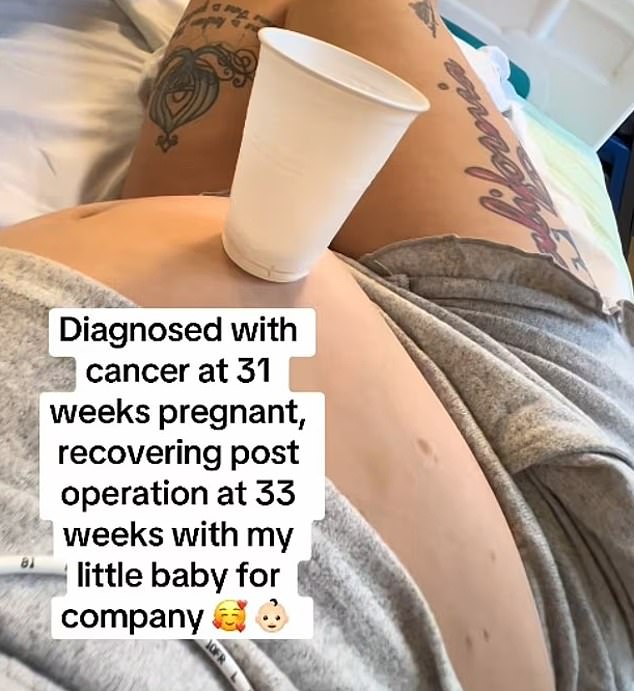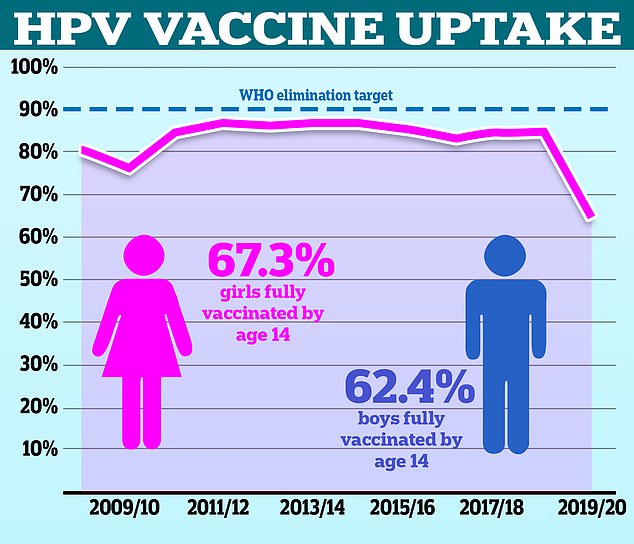A mother-of-two has told of the shock of being diagnosed with deadly mouth cancer while seven months pregnant, despite no family history or obvious risk factors.
When Holly Stubbs, from County Durham, noticed a small lump in her tongue, she assumed it was related to pregnancy hormones.
She first visited a dentist, who referred her to an oral health specialist, who confirmed her suspicions that it was nothing to worry about.
The doctor assured her that, as she didn’t drink alcohol or smoke, it was likely a ‘pregnancy tumour, known medically as a pregnancy granuloma.
The non-cancerous overgrowth of tissue is found in five per cent of pregnant women’s gums and tongues.
However, the doctor removed a sample of the growth and sent it off for a biopsy just to be sure.
At the beginning of May, the results revealed the devastating truth—she had mouth cancer.
She said: ‘It’s just bad luck. It’s one of those things. I have no risk factors, but here we are, and we know we haven’t removed it all.’

Doctors initially told Ms Stubbs her symptom was not likely to be cancer as she had no obvious risk factors
Ms Stubbs’ diagnosis, shared with 50,000 viewers on TikTok, comes amid a rise in cancers of the mouth and throat in younger people over the last decade.
Cancer Research UK data shows a 60 per cent rise in women and a 34 per cent rise in men aged 25 to 49, between 1993 and 2019, developing head and neck cancers, including those of the oral cavity.
And a 2024 report by the Office for Health Improvement and Disparities (OHID) and the University of Sheffield found the rise in head and neck cancers was driven by a rise in oropharyngeal cancer.
This is disease that starts in the part of the throat just behind the mouth and includes tonsil cancer and cancer in the back of the tongue.
Doctors have found that oral sex is the biggest risk factor for this type of cancer — outpacing smoking, alcohol consumption and an unhealthy diet.
This is because the acts can lead to an HPV infection at the back of the throat or near the tonsil.
HPV is a common virus spread through close contact, including sex, and is usually harmless, but in some cases—for reasons not fully understood—it can trigger cancerous changes in healthy tissue.
Some 70 per cent of cases of mouth and throat cancers are caused by HPV, according to Cancer Research UK.
Experts say those with multiple oral sex partners have an up to nine-fold increased risk of throat cancer.
Currently, mouth cancer is the sixth most common type in the UK, with 8,846 new cases diagnosed each year, and around 3,000 deaths.
There is a vaccine for HPV which is known to help slash the risk of oral cancer. It is more than 80 percent effective and available in much of the developed world.
It is a two-dose vaccine now available for children between ages 11 and 12. The shots come 12 months apart.
For people who missed that window, a three-dose shot is available to people 15 to 26.
The vaccine has been offered to girls in England and Wales since September 2008 before being widened to include boys in 2019.
On the day of Ms Stubbs’ diagnosis, the business owner had seven hospital appointments.
This included giving her blood thinners as both surgery and pregnancy put her at a higher risk of blood clots.

Just 67.2 per cent of girls were fully vaccinated in 2021/22, down from a high of 86.7 per cent in 2013/14. Some 62.4 per cent of boys, who have been offered the jab on the NHS since 2019, were jabbed in the most recent school year, NHS data shows
To protect her unborn baby’s lungs, she had to have steroid injections as her child had to be delivered sooner than expected.
The mother also needed an operation to remove part of her tongue—including the cancer—at 33 weeks pregnant, which left her temporarily unable to talk or eat.
The mother revealed the heartbreak of the moment she broke the news to her two young children.
‘We’ve had to give them as many details as we can, without, you know, traumatising them—We’re going to just take one day at a time,’ she said.’
A week ago, during an appointment with her cancer specialist, she learned that the cancer was larger than expected.
While doctors were confident they removed all the cancer from her tongue, they said there is a 30 per cent chance it has reached the lymph nodes, meaning it is likely to spread to other areas of the body.
The surgeons will perform a second operation to remove them and send the samples off for testing.
Ms Stubbs is now awaiting the birth of baby before her next surgery.
It is important to catch the early signs of mouth cancer for a better chance of survival as it can spread rapidly.
Dentists can help spot the early signs, as can doctors.
Tell-tale symptoms include ulcers that last longer than a fortnight, swelling or lumps, red or white patches, loose teeth, chronic sore throat and numbness.











